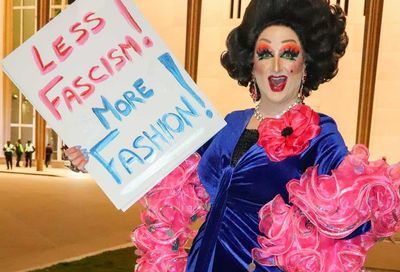Supreme Court Rejects Lawsuit Over Gender Support Plans
The U.S. Supreme Court declined to take up parents' challenge of a Montgomery County policy meant to support transgender youth.

The U.S. Supreme Court declined to review an appeal from parents in Montgomery County, Maryland, who were challenging the school district’s policy of crafting “support plans” for youth who are transgender.
Three parents sued Montgomery County Public Schools over guidelines adopted in 2020 that allow schools to develop a plan for helping transgender students have their gender identities affirmed at school with respect to names, pronouns, and access to certain facilities.
The guidelines require schools to “respect the students’ wishes to keep certain information confidential.”
Despite claims from anti-LGBTQ groups that the policy is encouraging students to fully transition without their parents’ knowledge, the policy does not allow school staff to prescribe or administer any gender-affirming hormonal or surgical treatments.
In their lawsuit, the parents at the center of the case argued that the guidelines deny them the right to make decisions about the education and upbringing of their children, keeping them out of the loop about issues affecting their children by allowing those children to socially transition at school without notifying their parents.
They also claimed that, by not forcibly outing transgender students to their parents, the guidelines violate both parental rights provisions in the Maryland Declaration of Rights and the U.S. Constitution’s guarantee of due legal process under the 14th Amendment.
School officials, meanwhile, argued that the guidelines were intended to “ensure a safe and respectful school environment” for all students, arguing that the fact that a student may choose to disclose information to a teacher or administrator does not authorize that adult to disclose sensitive information about the student to others.
A federal judge dismissed the lawsuit, siding with the school district to find that the guidelines advance MCPS’s goal of protecting students’ safety and privacy.
The 4th U.S. Circuit Court of Appeals adopted a different argument and dismissed the case on a technicality, noting that none of the families involved in the lawsuit had children who identified as transgender or nonbinary.
As a result, they had never received personalized gender support plans, and their parents could show no harm — including the deprivation of their rights — that they had suffered as a result of MCPS’s policy.
Judge A. Marvin Quattlebaum, Jr., who penned the majority opinion for the 4th Circuit, did note that the parents’ concerns may be valid and even potentially “persuasive,” implying that if the students in question had identified as transgender and received gender support plans, the court may have sided with the parents.
Upon appeal, the Supreme Court left the 4th Circuit’s ruling in place and declined to take up the case.
However, that does not mean the issue is permanently resolved. It is possible that, in the future, parents with anti-LGBTQ views may attempt to challenge the policy, potentially even forcing their children to temporarily claim to be “transgender” for the purposes of entrapping school officials, which would subsequently allow the parents to claim they’ve suffered “harm” and sue to have the district’s policy overturned.
The Supreme Court’s refusal to take up the Montgomery County parents’ case marks the latest example of how the high court has dodged taking up potentially controversial LGBTQ cases by refusing to overturn lower court rulings.
Three years ago, the Supreme Court declined to hear an appeal from the Gloucester County School Board in Gloucester, Va., of a 4th Circuit ruling that found the district’s policy barring transgender students from restrooms that align with their gender identity was discriminatory and unconstitutional.
Last year, the high court refused to take up an appeal of a lower court ruling blocking West Virginia from enforcing a state law barring transgender athletes from female-designated sports teams.
Last week, the 4th Circuit ruled, in another case out of Montgomery County, that religious parents in the district can’t opt their children out of classroom lessons incorporating books with LGBTQ themes or characters. The court found that the group of parents suing over the policy had failed to demonstrate how the books would be used in lessons.
Furthermore, the appeals court declared that, despite the lack of an opt-out policy, using LGBTQ-themed books did not compel the students to change their personal religious views or views opposing homosexuality as sinful, and therefore did not violate their constitutional rights.
Support Metro Weekly’s Journalism
These are challenging times for news organizations. And yet it’s crucial we stay active and provide vital resources and information to both our local readers and the world. So won’t you please take a moment and consider supporting Metro Weekly with a membership? For as little as $5 a month, you can help ensure Metro Weekly magazine and MetroWeekly.com remain free, viable resources as we provide the best, most diverse, culturally-resonant LGBTQ coverage in both the D.C. region and around the world. Memberships come with exclusive perks and discounts, your own personal digital delivery of each week’s magazine (and an archive), access to our Member's Lounge when it launches this fall, and exclusive members-only items like Metro Weekly Membership Mugs and Tote Bags! Check out all our membership levels here and please join us today!























You must be logged in to post a comment.